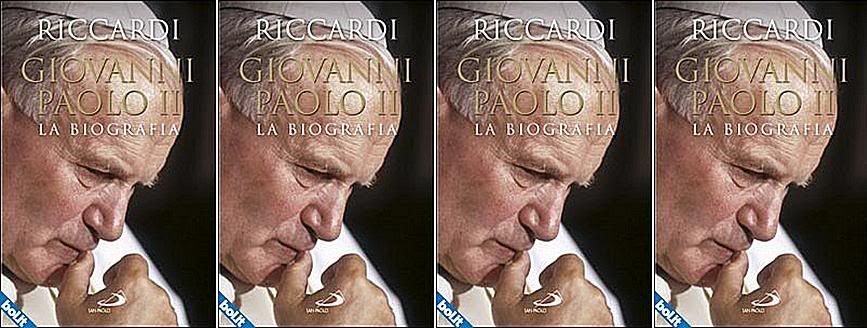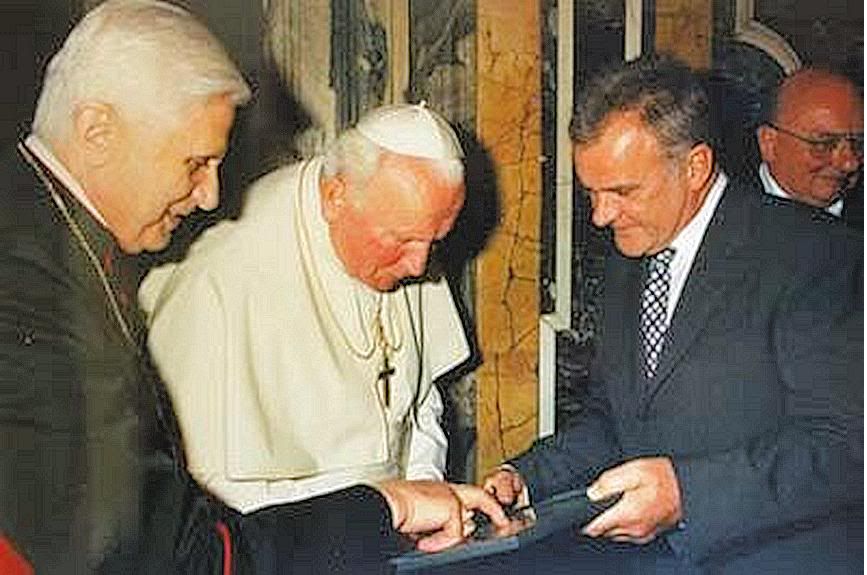 Andrea Riccardi (born 1960), who founded the Sant'Egidio Community when he was a high-school teenager, is professor of contemporary history at Universita di Roma-3, and has written 21 books so far about the Church in today's world. Two of them were about Pius XII and one about Paul VI. he has now written a biography of John Paul II
Andrea Riccardi (born 1960), who founded the Sant'Egidio Community when he was a high-school teenager, is professor of contemporary history at Universita di Roma-3, and has written 21 books so far about the Church in today's world. Two of them were about Pius XII and one about Paul VI. he has now written a biography of John Paul II.
In a new biography of John Paul II,
Benedict XVI speaks about him
by Salvatore Izzo

 Riccardi with John Paul II and Cardinal Ratzinger in the 1990s.
Riccardi with John Paul II and Cardinal Ratzinger in the 1990s.
Vatican City, April 6 (Translated from AGI) - "he carried on his shoulders, which had become frail, the weight of his ministry. His life, in its final years, was a true catechesis of pain".
Words used by Benedict XVI in talking about John Paul II to Andrea Riccardi for his book on the late Pope. speaking as a privileged witness and participant throughout most of the long Pontificate of Karol Wojtyla, who described his Prefect for the Doctrine of teh Faith in one of his books as 'his trusted friend'.
Riccardi's book, which fist came out in March, was presented tonight by Cardinal Camillo Ruini.
Benedict XVI recalls that "At the time of his (Wojtyla's) election, the real problem was to emerge from the crisis of the Church in those years. There was a need to observe what Vatican II taught with maximum fidelity. The very way the Council was received by the Church had to be purified. It was not a structural reform that was necessary but rather a profound spiritual reform".
Papa Ratzinger describes particularly an episode in which he was a protagonist: the 'correction' that the Vatican had to impose on liberation theology.
"John Paul II," says his successor, "insisted that one should consider teh positive aspects of liberation theology after having clarified its negative aspects and its improper admixtures. I am not sure how much we succeeded in reformulating it positively.
"However, our second Instruction on liberation theology was clearly along this line, touching on a problem [poverty] and a perspective that are very real and felt deeply by John Paul II".
About his predecessor's administrative style, he said the Pope greatly esteemed the work of his Secretariat of State and his co-workers in teh Roman Curia.
"He had a view of mankind that enabled him to grasp certain problems acutely. He thought about ways of intervening that included his own direct and personal participation."
He also noted that in the relationship between John Paul II and the Church as institution, "between his own personal feelings and the need to administer, perhaps his approach was different from Paul VI or Pius XII who had spent most of their life working in the Vatican and the Secretariat of State".
But Benedict XVI's most touching words had to do with the John Paul II and his illness.
"At the time, it was probably reasonable to ask whether it was possible to govern the Church in a similar state of health. Now, looking back, we can better understand the weight and significance of those years. And that yes, it is possible to govern even with so much personal sufffering.It was certainly something extraordinary. After such a long Pontificate that had been marked by such an active life, his time of suffering was very eloquent".
In describing the personage of Karol Wojtyla, who was one of the great figures of the 20th century and the dawn of the third millennium, Riccardi brings us to the heart of events which changed history, and recalls the immense spiritual energy of his person and his ministry, along with the tremendous impact he had on the Church and on the world.
But among all the witnesses he quotes and the documents he presents, his conversation with Benedict XVI stands out.
A significant story Riccardi recounts from the October 1978 Conclave is likewise striking.
"During the general congregations of the cardinals before the Conclave, the Primate of Poland, Cardinal Wyszynski, made an address about the difficulties of Catholicism in eastern Europe but cited the growth of vocations as a sign of hope. He believed it meant that young people looked to the Gospel and expected much of it.
"At the same time, he pointed out that Communism was apparently in crisis, and that the assumption that its progress in the world was irreversible probably needed to be verified. Especially, since, he said, Communism appeared to be in retreat, increasingly failing at every level - ideological, social and economic."
Riccardi notes, "It seemed nothing but the wishful thinking of an old visionary. But it would all become reality with John Paul II".

[Modificato da TERESA BENEDETTA 07/04/2011 00:33]